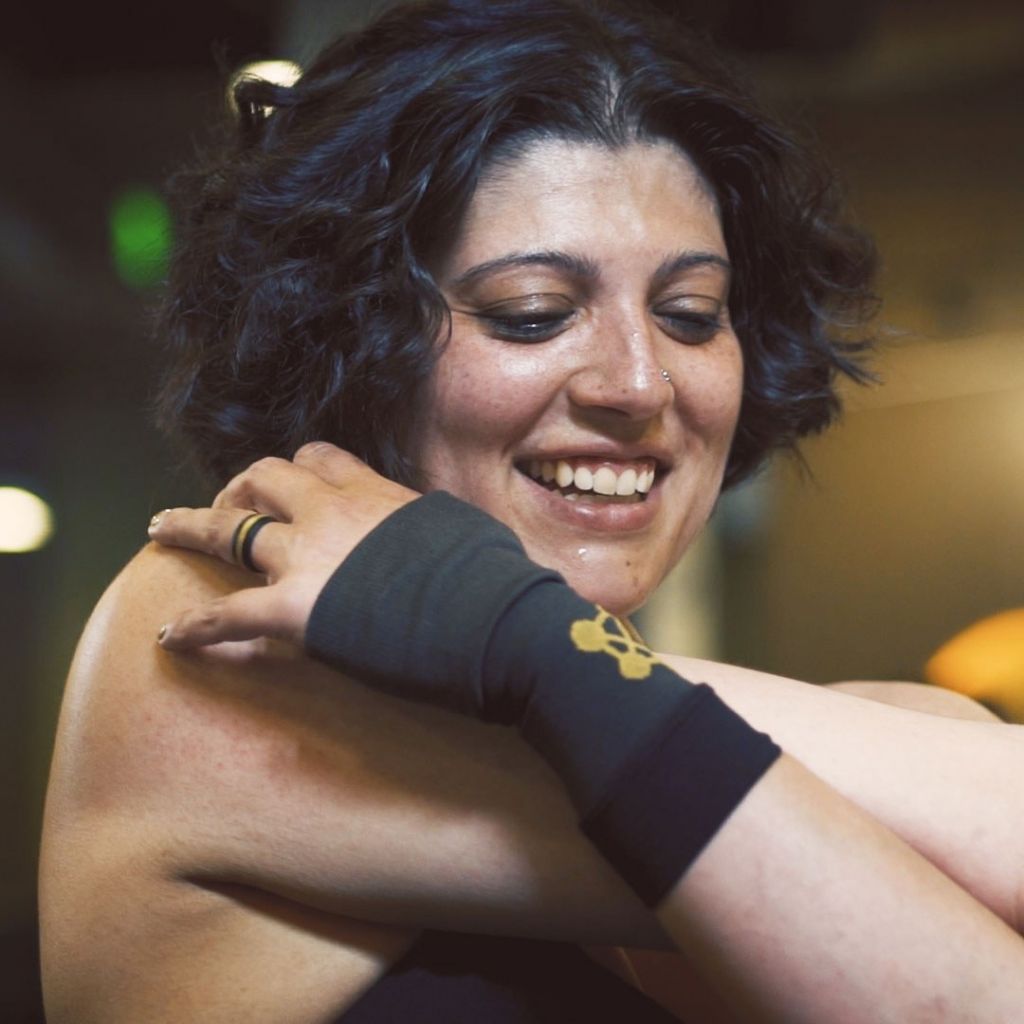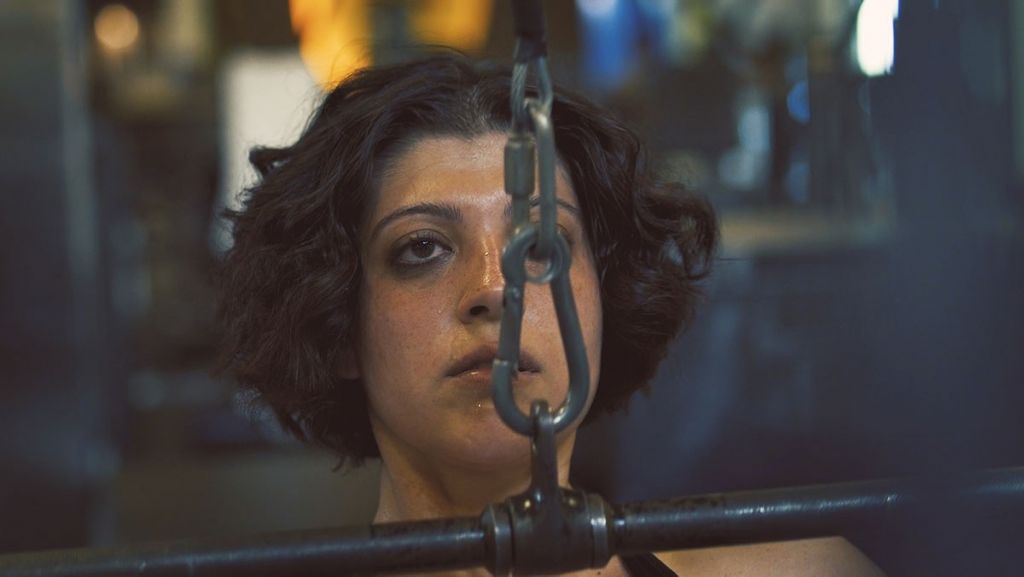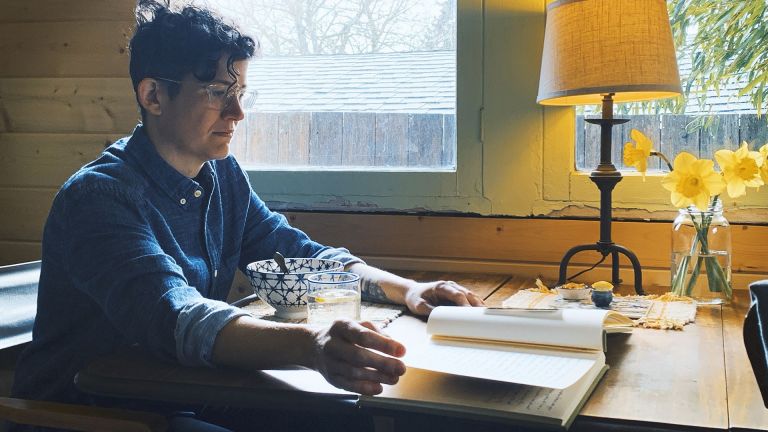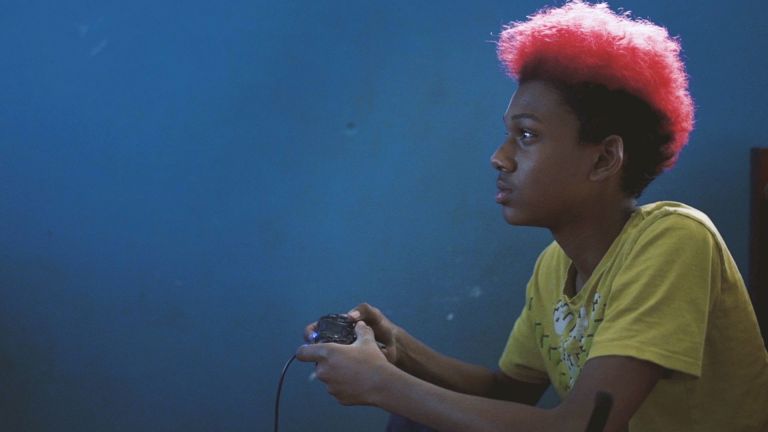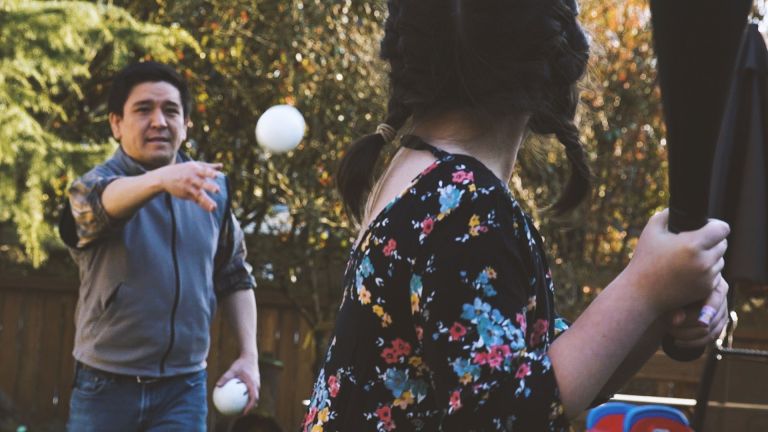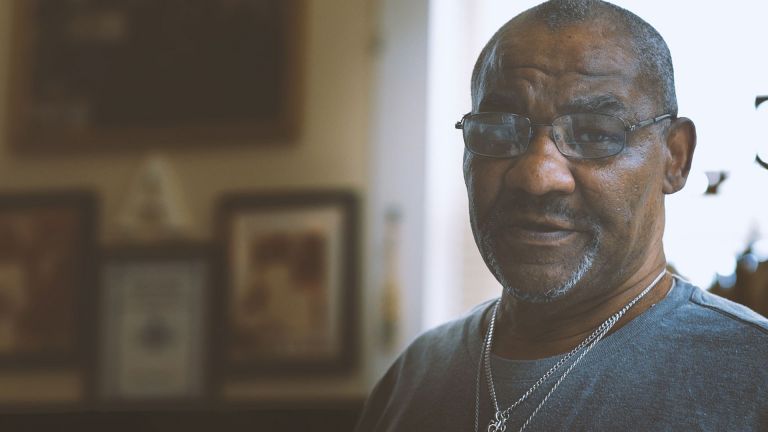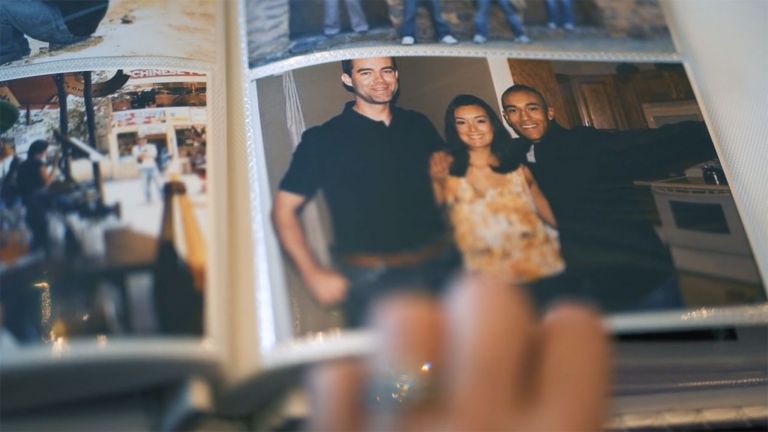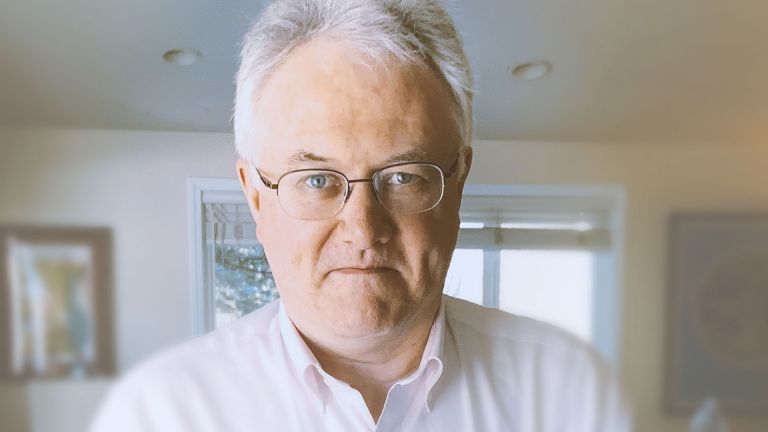Zee Wolters
Zee Wolters’ mother, Gillian, died in 2014 after a seven-year battle with breast cancer. Zee was 31 at the time and was the first person in her peer group to experience parental loss. Her grief caused her significant physical pain (e.g., migraines, joint pain), which led her to discover a passion for weightlifting.
Zee: My mom.
It was really hard because I’d been married for a few years. I had just got accepted into graduate school. So I was working full time, going to be a student full time, and now add caretaking full time to that. So, it was very challenging to balance everything and to deal with that at a young age.
Since we knew that this was stage 4, that she wasn’t going to survive from this, everything that I did, I weighed it against, “Am I going to regret this later?” So if I don’t go over to my mom’s house tonight and have dinner with her, is this something I’ll regret? You don’t realize how much of a strain that is at the time.
After she died, on the one hand, there’s a relief. That “Oh wait, I don’t have to think like that anymore.” But now how do I make my decisions?
I did have some, some good friends that, that did help out, that I’m very grateful for, but there wasn’t anyone around my age grieving for the loss of a parent, so it was a fairly lonely feeling.
My mom was a really great cook. One of the benefits of a long, prolonged illness is that, you know, you can kinda be like, okay, this is something I wanna learn from my mom. I felt that there were a lot of conversations that we had around food. The other thing was that there is a Middle Eastern grocery store near her house. I rarely went to that store. She would always go, and she would always ask if I wanted anything, and she would pick it up for me. And so the first time I had to go and do that without her around, was really emotional. And I had kind of gone through the aisles, and I sort of picked up other stuff, and I was slowly feeling emotional. But it was kind of when I went to the, the butcher section, that I just lost it. And I just left the whole cart there, and, um, just had to leave the store.
I think in the sort of first couple years, um, of my grief, I didn’t, I didn’t see a whole lot of changes ... and I think that was one of the things that causes stress because people say, “oh okay, you know, like, you should be over it” you know after so much time, then it lessens. And it really felt like for the first 2 almost 3 years that okay nothing’s changing, like it feels like I’m still angry, I’m still upset, I’m still crying in the shower. I’m crying when I go ... every time I go to the grocery store... And part of that is feeling like your personality has totally changed this is like okay it, it’s not getting better. And, and that was kind of a lot of stress as well.
I think after about 3 years I felt like I okay, I need to change things up and do things differently and to at least try things, and some of the things didn’t work. Some of the things did work. And now I’m at the place, where I’m like, okay, well, this works for me right now. And I’m guessing that that will continually change. And, and that was kind of hard. ’Cause I felt like, okay, I have to have a specific tradition that I do every single year on each of these days. Like, this is what I do on her birthday. This is what I do on the anniversary of her death. And then the next year would come and I’d be like, I don’t feel like doing that. And then it was stressful ’cause I was like, but this is what I’m supposed to do. Like, this is what I said I was going to do last year, so I should be doing it again. So I think becoming comfortable with the fact that things change and that that’s OK.
I kinda have been generally feeling a little bit better, um, over the past year. And so I think part of why this, her five-year anniversary, hit harder was because I was feeling more like myself. That, um, I didn’t ... and, and I didn’t feel like I was having the anger issues that I had previously. I felt that, um, I was able to communicate, um, in better ways and to verbalize. I, I learned strategies on how to (laughs) verbalize some of my feelings.
And also that I, I was enjoying life. That I was doing things that, um, were different, and I was having fun. Um, so I think, you know, part of it was the enjoyment I was having. Um, the other part was that I was doing a lot of things that were not even on my radar when my mom was alive. So it wasn’t even like ... you know, yeah, she never knew me as a college professor, but she knew that that’s where I was going to be. Um, so that was a little bit emotional. But it was like, okay, she knew that that, that this was where my life was gonna go. Um, she didn’t know that I was gonna get weirdly excited about, uh, bodybuilding Um, so I think, you know, some of it ... a lot of the pain came from the fact that, you know, I, I can’t tell her. I mean, yeah, I can sit by her grave and tell her these things, but I can’t really tell her. Um, but ... so there was, there was pain with that, but on the other hand, yeah, like, I was actually ... I found things to be excited about. And for the most part this past, you know, year, year and a half, I’ve been enjoying life. That, that things look good. They’re not ... you know, there, there’s still pain and ... but that’s not the sort of major thing anymore.
I think in the sort of first couple years, um of my grief, I did, I didn’t see a whole lot of changes that it ... and I think that was, sort of one of ... one of the things that causes stress because people say, oh okay you, you should be over it and you know this is, you know after so much time then it lessons ... and it really felt like for the first 2 almost 3 years that okay nothing’s changing, like it feels like I’m still angry, I’m still upset, I’m still crying in the shower. I'm crying when I go ... every time I go to the grocery store, the butcher thinks I’m a, a complete uh crazy person. Um and it, it was as, as part of that it, it ... feeling like your personality has totally changed this is like okay it, it’s not getting better. And, and that was kind of a lot of stress on that as well.
Um I think after about 3, 3 years, I guess? And again, um some of it was definitely like I felt like I okay, I’ve hit rock bottom and a lot of that was evident simply because of the physical pain, so I think had I not had a lot of the physical pain, that maybe I wouldn’t have been so adamant that okay I need to do something else ... that I can’t just keep doing what I’m doing, but the fact that I was literally in so much physical pain and I, you know, taking headache medicine every day wasn’t something that I wanted to, to be doing.
Um that I felt like Okay I need to, I need to change things up and do things differently. Um and I think, you know, having that spur me on to do things differently um ... and to at least try things and some of the things didn’t work. Um some of the things did work. Um I, I now have a few new skills I, I read and article that said knitting would help, so I took up knitting which was interesting because I spent about 6 months screaming at the knitting needles ’cause they wouldn’t do what they were supposed to do. I think I broke a bunch. I think I burned some I like quite a few balls of yarn because I was mad that they didn’t um organize themselves into, you know, nicely shaped scarves, so ... But now I can knit, so ... (laughs) And everybody gets, you know, lumpy scarves for Christmas.
But um I, I think some of it was just that there, at, w- ... at the point where I finally said okay I can’t continue like this because I’m in too much pain. Open me up to okay, what can I do? What else can I try? Let me try something out of the box and so knitting or doing the weight lifting um or things that I hadn’t thought would be of interest to me beforehand. Um and I think from there I don’t necessarily wanna say that the grief has lessened, but those unexpected moments have decreased. Um there’s less bad Thursdays uh-hum. There’s uh less problems in the grocery store and some of it is also that um, you know after 3 years you kinda know like okay, it’s Thanksgiving and I’m going to have a meltdown in the grocery store.
So there’s some preparation that you can make you, beforehand ’cause you, you know okay I’ve done this for 3 years, it’s happening. Um so some of it was that, but I definitely feel that there are less of those moments, um over time, but when those moments occur, I feel like the intensity is still the same. So the, there’s ... it’s not necessarily a every day, every moment occurrence, but when it does happen, it, it is still extremely painful.
I have a sort of memorial to my mom, uh, definitely in my kitchen with, um ... where my cutting board is. And I sort of have a, um, a little, it’s sort of a three-pronged, uh, picture frame. And, uh, there are teacups. And there was actually a, uh, British teahouse that we used to go to. And I had, um, bought this picture frame, um, from them. And it was, it was some place that, uh, my mom and I went to quite often actually. and I always sort of do my, um, my meal preps and my food preparation kind of in front of those.
She’s, uh, buried in a, um, Muslim cemetery, um, about an hour, to an hour and a half, away from here. Um, so it’s not like it’s some place I could go to, um, regularly. Uh, but I do go. Um, I usually go, you know, Mother’s Day, uh, her birthday. Um, as a family we all go on religious holidays. So we do, um, the prayers and then we go to the cemetery after that. Um, and then I’ll usually go, uh, usually Christmas Eve or Thanksgiving. Um, and then I’ve actually, I’ll go on Halloween, um, pretty regularly. And, uh, not so much of a Day of the Death type thing, but Halloween was kind of a big holiday in, (laughs) in our family. We’d always do something major so it just kind of felt like the right day to sort of go to the cemetery.
And, um, I usually go early in the mornings when, um, it’s quiet it’s usually, again, usually first, first thing in the morning. Seven, eight o’clock in the morning is when I, I try to go. And I usually bring coffee and, um, a doughnut (laughs). Um, and, and I usually just, just sit there and, and have breakfast. And I’ll kind of update my mom on things that have been going on, and, um, stuff that I’ve done. you know, clean up the grave a little bit. Put ... you know, if it’s Christmas time, I put a little tiny Christmas tree. If it’s Halloween time I bring pumpkins. You know, that kind of stuff. Um, and, and that’s just kind of a small ritual that, that I usually do.
That initial period where, where people are around, they’re sending flowers, cards, um, food, I feel like it almost needs to happen later. Because in that, in those first few weeks, um, there, there’s a shock. And it’s, there, there’s so much to be done. there’s all of the details of the funeral lined up, and the memorial service. So there’s a lot of, okay, I’ve got to talk to the caterer. And I’ve got to get chairs and tables and tents. And, and all of this stuff. Um, so I felt like in those, first month really, that there was so much going on that needed my attention, that I didn’t really focus on the grief. Uh, because there were distractions.
And then after that period when, okay, everything’s taken care of ... we’ve got all of the bank stuff taken care of. We’ve got the memorial service taken care of. The funeral is taken care of. Now there’s not a 100 things that need to happen right now this minute. And all of a sudden it’s, it’s almost like it’s quiet. And it’s like, now your mind can think of these things. And, and I think that ... for me, that was, that was it. Is that, okay, now, now my mind’s not distracted ... and now my mind can just focus on this one very painful thing and, oh, my God, I’m freaking out. And now it’s a month and everybody has sort of, okay, you know, we ... it, it’s been the proper time. And, and now I’m starting to, to freak out and panic and have all these issues. And I feel like, oh, like, I, I don't feel like it’s appropriate for me to reach out. Because people are expecting that, okay, she’s already had this freakout and we’re good, and we’re moving forward.
For quite a few months I, on Thursdays, I just, I couldn’t get up. Um, I’d immediately go to the junk food. I’d, you know, be in a bathroom all day. Um, I ended up, I was fortunate enough to have a flexible work schedule. And I ended up switching my work schedule around. But I didn’t really understand why I couldn’t do anything. Why it was so difficult to physically get moving. Um, and it wasn’t until, a few months down the line, quite a few months actually, that a friend, I happened to mention it and it was such a small thing that I didn’t really consider it a big deal. But I happened to mention it to a friend and she asked “When did your mom die?.” And I was like “Oh, it was a Thursday morning” and my body had, sort of, knew that. And it was depressed and hurting, and wasn’t functioning. But I had no, you know I just thought, “Okay, this is a weird thing that’s happening and I don’t, I couldn’t really mentally figure it out.”
I feel like everything did sort of magnify that it wasn’t just “Okay, I’m going to be upset for this short period.” It’s like this one thing will set me off for an entire week. because I had difficulty expressing everything or sort of high levels of anger, I also needed everything to be, to go perfectly. So I needed all the schedules to remain perfect. You know, I couldn’t handle last minute changes or people canceling. I needed, you know, everything to be perfect and in order the way I had planned it. Because if that was in order then I felt like I was a little bit more emotionally able to deal with some of the grief. Whereas, when things went out of order, then I felt like I had to deal with that on top of the grief. And that would also just kind of send me spiraling downward and I would just, again, usually respond anger issues and yellow. And just not being able, just sort of, also wanting to distance myself and lock myself away in a room and not deal with anyone.
